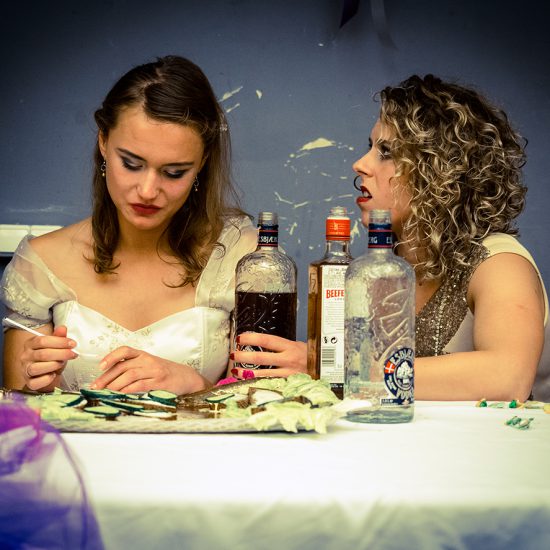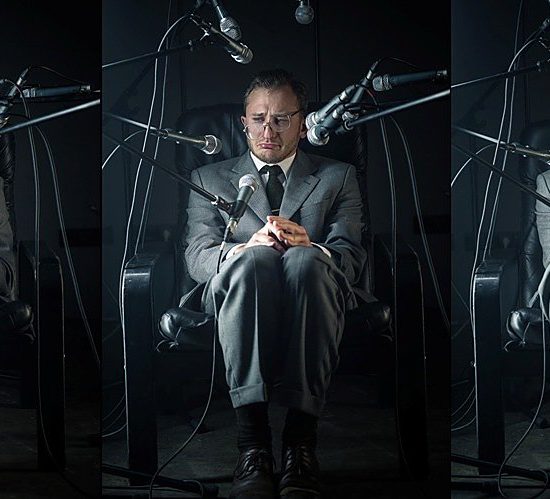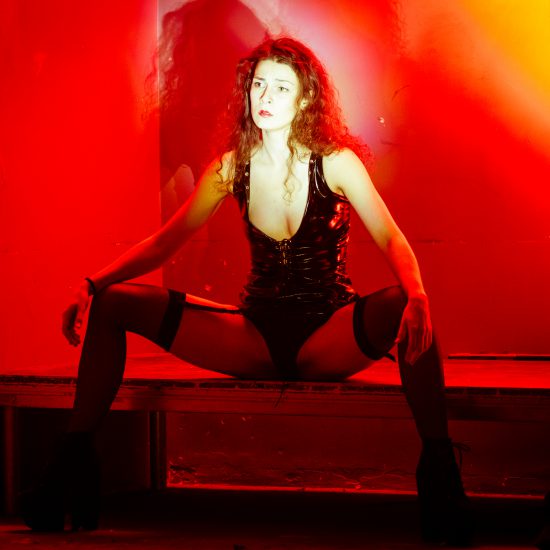Turning into a human being
The play “Krapp’s Last Tape” directed by Oskaras Koršunovas and shown at the OKT/Vilnius City Theatre was the last premiere of the season, rounding off a rather poor year of the Lithuanian theatre. Last year, our theatre has missed yet another opportunity to take on artistic research of poignant subjects. The fear or reluctance to go beyond professional traditions and rebel, the suppressed need of the younger generation to deny the older one – such is the reality of our aging theatre.
In this context, the appearance of “Krapp’s Last Tape” by a classic playwright of Absurd Theatre is rather interesting. The play exposes the two problems that concern the entire theatre community: the passing of time and the fragility of identity resulting from it.
Three epochs collide
This last production of O. Koršunovas has a few other interesting aspects as well. In the play, Krapp, already an old man, listens to recordings of his own voice made three decades earlier, when he was 39, in which he talks about his youth. The play is a meeting point for people from three different epochs: O. Koršunovas, a 44-year-old director, Juozas Budraitis, a 72-year-old actor, and S. Beckett, a playwright from the middle of last century.
The Irish playwright once said that he tried to write plays in a way that minimized the director’s chances to change their structure. So, it is curious to see how the material of the play is be treated by O. Koršunovas who has allowed himself the liberty of reconstructing drama classics more than once.
“Krapp’s Last Tape” is a confrontation with the passing life and its imminent end.
We see an old and sickly loser who listens to his voice recorded three decades ago. Krapp is a writer who has sold no more than a dozen copies of his books to a few overseas libraries.
Throws a banana at the audience
The directors treats S. Beckett’s text with respect – he pays attention to most of the notes and comments of the playwright. At the onset of the play, J. Budraitis is sitting on one of the chairs meant for the audience, as atmospheric music by Gintaras Sodeika playing is in the background.
Once the lights go off, Krapp gets up and walks to the tiny area in the corner of the OKT rehearsal hall, designed by the visual artist Dainius Liškevičius, containing a table with a tape recorder and a desktop lamp which lights the space with a narrow beam of light. He is panting heavily and from time to time gives a mischievous chuckle.
Krapp gets a banana from a box, peels it with pleasure, puts it in his mouth, and begins teasing the audience. More than that, he actually throws the banana skin at it. Then another banana. This time Krapp is less playful: he peels the banana nervously, and then throws it with a backward hand motion at the audience. Then he hides in his corner and hastily eats the fruit like an anxious hamster.
After that, Krapp slowly walks behind the audience, which now hears the sound of a bottle being nervously opened followed by greedy gulps. Apparently, Krapp is drinking alcohol because he shakes, sighs, burps and shuffles back awkwardly to the table. He takes out a tape, puts it on with difficulty and, as a result, we finally hear a recording being played.
And now we immediately face (or hear, to be more precise) almost the only interpretative act of Koršunovas, basically turning the play upside down: while the author has indicated that the recorded voice of Krapp should be strong and pretentious, what we hear is a tired and rasping voice of Budraitis-Krapp.
Gives his own interpretation of death
By juxtaposing the actor’s physical and emotional expression, Koršunovas offers his own interpretation of death: the process of aging, drinking, and physical degradation is presented as a sobering of thought and consciousness, turning into a human being.
From a grubby and dishevelled ape, someone who devours bananas in a corner like a hungry rodent, from a dotardly old man, amused by the sound of the word “spool”, who giggles as he throws banana peels at the audience, Krapp slowly turns into a human being.
“Perhaps my best years have gone. But I wouldn’t want them back,”- we hear from the tape in the last scene, as Budraitis-Krapp collapses on his chair. Strong enunciated words coming from the recording are the words of a person who understands the inevitability of death and consciously gives in to it – a sort of link with “The Lower Depths”, which is performed within the same walls.
The squealing and rasping tape resembles Krapp in the beginning of the performance. In the end it breaks…
The actor doesn’t hang himself. Nor does he ruin the song. Sentimental? Pathetic? Maybe. But no more than the passing of time is.



